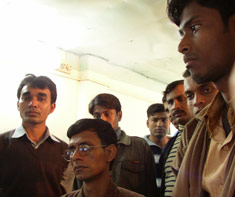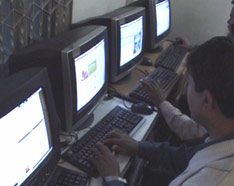Please note - Ndiyo has now officially closed its doors, at least as a legal entity - but we've kept the site alive in case any of the information is useful to others.
Our thanks to all those who helped out and were involved in so many different ways! The Ndiyo legacy lives on in the ultra-thin-client work at its spin-off DisplayLink, at Plugable, at NoPC and elsewhere...
CIC - starting a revolution in Internet access
The first Ndiyo-based Community Information Centre opens in Bangladesh: a four-screen internet cafe with internet connectivity via a mobile phone!

As from 17th January 2006 there's a new business venture in Fultola, an area of Bogra town, in Bangladesh. At first sight, it looks like a standard Internet cafe - a one-room "commercial unit" which opens onto a bustling street; four screens each with a keyboard and mouse; customers browsing the Web and reading email.
But look inside and you find that this "Community Information Centre" (CIC) is radically different from a typical Internet cafe. For one thing, there's only one PC, which functions as a server: each of the other workstations is powered by a small device, not much bigger than a cigarette packet. For another, there's no wired connection between the server and the outside world. Yet the Centre is clearly hooked up to the Net. The customers are browsing the web and sending email.

The clue to how it's done is provided by a Motorola clamshell mobile phone connected by a USB cable to the server. The Centre is getting its Internet connection via an Edge-enabled mobile phone! Or, looking at it another way, a mobile phone is giving four people simultaneous access to the Net! In the process, it's enabling them to keep in touch with relatives abroad, to get information about market prices and job opportunities, to complete online forms and browse government and other web sites.
The Fultola CIC is a joint endeavour by the Ndiyo Project (which designed and installed the local networking system); Grameen Phone (a leading Bangladesh mobile operator); Grameen Telecom (who run the hugely successful Village Phone microfinance initiative in Bangladesh); and Newnham Research, a Cambridge-based company created out of the Ndiyo Project to develop thin-client networking technology. The project was co-ordinated by a team working for the GSM Association, the global confederation of mobile phone operators. The aim was to explore the extent to which mobile networks could provide Internet connectivity in developing countries, and to demonstrate the extent to which mobile telephony can increase access to online resources.
Underpinning the Ndiyo vision is a desire to redesign networked computing to make it affordable, supportable and environmentally as well as economically sustainable. Using Ndiyo-type thin-client networking in combination with Open Source software dramatically reduces the Total Cost of Ownership of Internet cafes, networked classrooms and small office systems. In the process, it makes it possible for entrepreneurs like Abu Sufian, the proprietor of the Fultola CIC, to make investments which earn revenues for them by providing services to local people and organisations.
We've made a four-minute video about the Fultola enterprise.
If the embedded video above doesn't work for you, you can download a copy using the links below. We recommend using the "QuickTime":http://www.apple.com/quicktime versions where possible. They can also be viewed using the Open Source VLC Media Player.
QuickTime (H.264)
- Very small (3MB)
- Medium (9MB)
- Large (21MB)
Windows Media:
Further Reading:
Follow these links for more information on:
